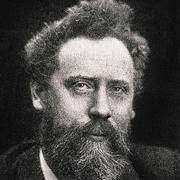Out of the night that covers me,
Black as the pit from pole to pole,
I thank whatever gods may be
For my unconquerable soul.
In the fell clutch of circumstance
I have not winced nor cried aloud.
Under the bludgeonings of chance
My head is bloody, but unbowed.
Beyond this place of wrath and tears
Looms but the Horror of the shade,
And yet the menace of the years
Finds and shall find me unafraid.
It matters not how strait the gate,
How charged with punishments the scroll,
I am the master of my fate,
I am the captain of my soul.
Published:
1888
Length:
Shorty
Literary Movements:
Impressionism
Anthology Years:
2022
2023
2024
Themes:
Identity
Poetic Form
Strength & Resilience
Literary Devices:
Ballad
a narrative poem or song that tells a story, often about a hero, adventure, or romance; ballads usually follow a form of rhymed quatrains alternating four-stress and three-stress lines.
End Rhyme
when a poem has lines ending with words that sound the same
Metaphor
a comparison between two unrelated things through a shared characteristic
Quatrain
A stanza made of four lines.

